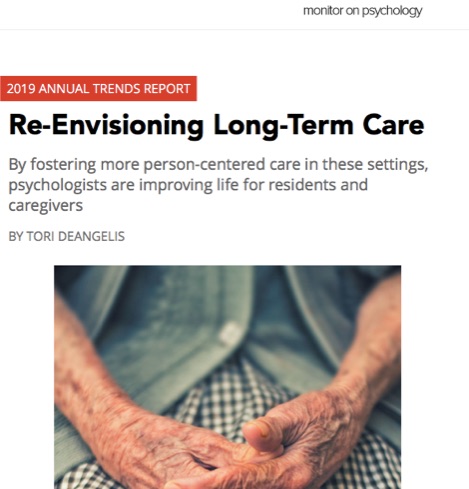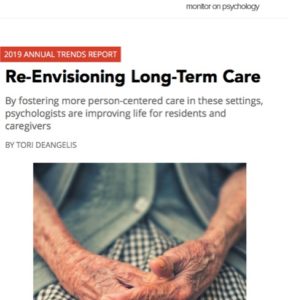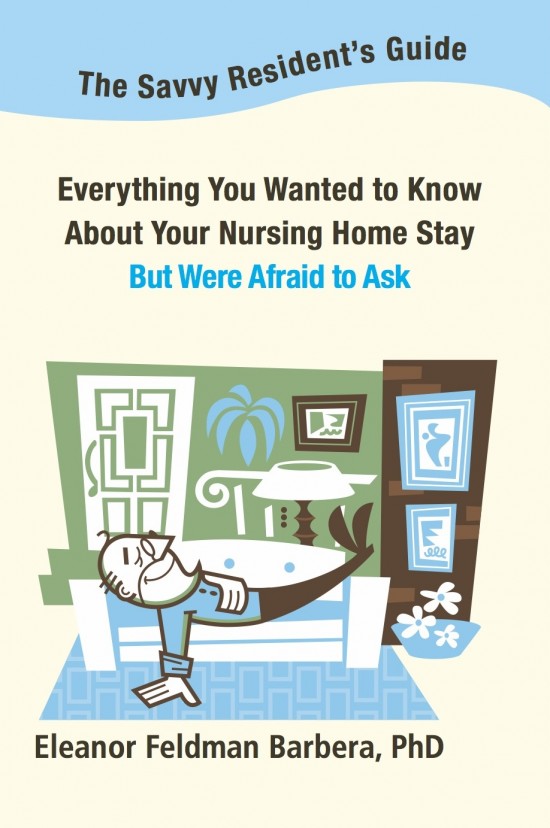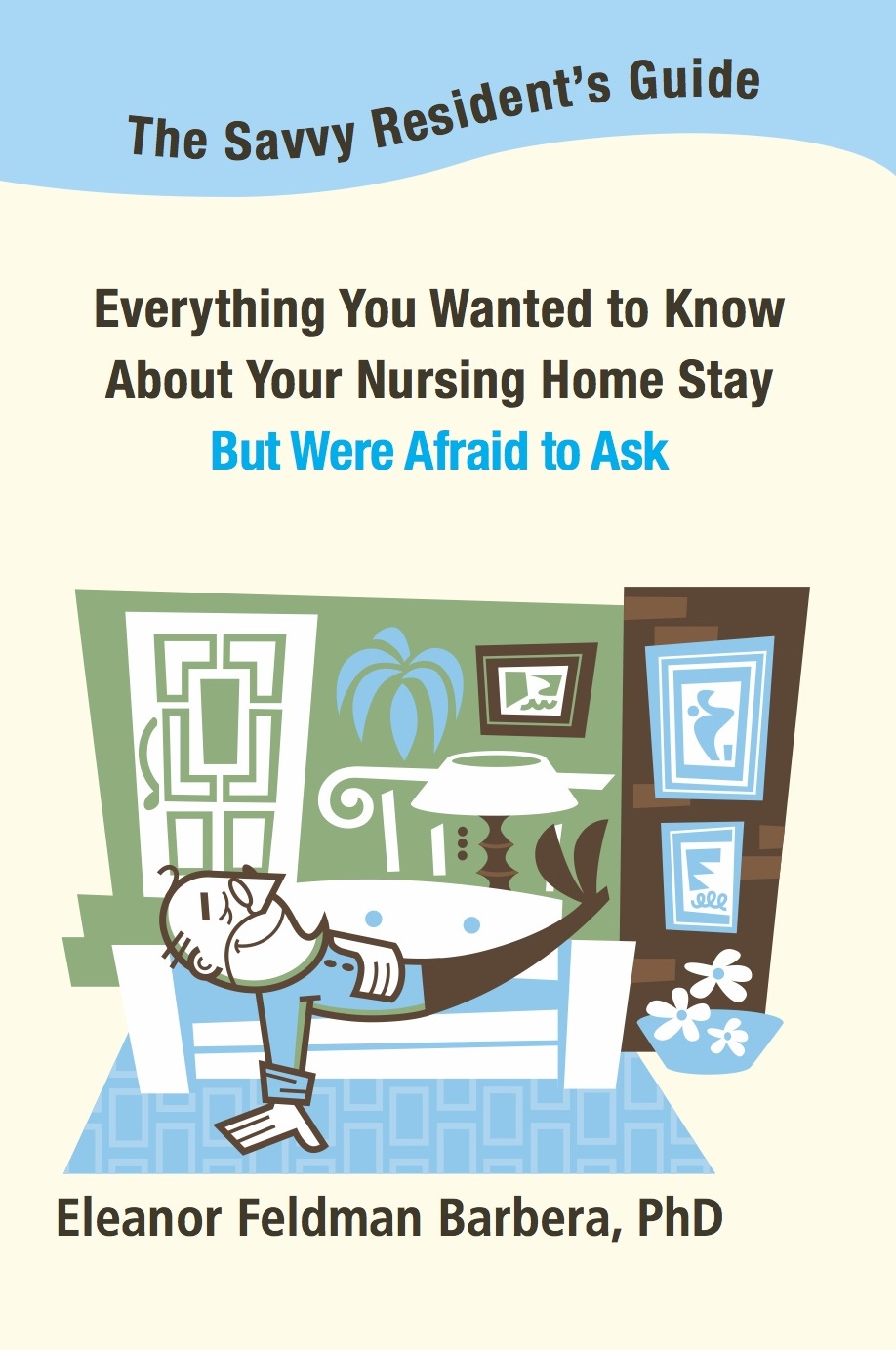Category: Common Nursing Home Problems and How Psychologists Can Solve Them
Posted by Dr. El - May 6, 2019 - Business Strategies, Common Nursing Home Problems and How Psychologists Can Solve Them, Communication, McKnight's Long-Term Care News, Role of psychologists

The top recommendation in the April 9 McKnight’s article “Researchers share 6 tips to improve nursing home care for blacks and Latinos” was to include a social worker on staff in the facility. “Great,” a reader commented, but “ask CMS … if they will pay for it.”
Perhaps, though better yet, social workers will pay for themselves.
A study published in March discussed the role and value of social work staff, with the surprising finding that deficiency scores are reduced twice as much when there’s an increase in social service staffing as compared to an increase in nursing staff. Lower deficiency scores can translate into better CMS star ratings and increased admissions, as well as reduced liability risk, creating a financial savings worth the price of a social worker salary.
The research brief goes on to report that while there’s been an increase in staffing in many other departments over time, the number of social workers remains low. The authors also note that there are no mandated qualifications for social work staff but that when social workers have higher qualifications such as a master’s degree, resident outcomes improve.
Interestingly, the other department that had almost as much effect on improving deficiency scores was the activities department, another psychosocially focused part of the team. (They didn’t study consulting psychologists, but I’d like to think we would have helped as well!)
For the entire article, visit:

Posted by Dr. El - November 12, 2018 - Common Nursing Home Problems and How Psychologists Can Solve Them, Psychology Research Translated, Resident care, Role of psychologists

The American Psychological Association published an article in the APA Monitor on “Trends to Watch in 2019.” I was pleased to see that geropsychology was Trend #5. Read what my colleagues and I have to say in Tori DeAngelis’ piece on Re-Envisioning Long-Term Care.

Posted by Dr. El - February 15, 2017 - Business Strategies, Common Nursing Home Problems and How Psychologists Can Solve Them, Communication, Customer service, McKnight's Long-Term Care News, Resident education/Support groups, Role of psychologists, Transitions in care

Here’s my latest article on McKnight’s Long-Term Care News:

Long-term care has an image problem. For a variety of reasons, we aren’t associated with good times. There are things we can do to turn this around, though, starting with the perceptions of our residents.
Most people who come to live in a long-term care facility struggle with a sense of failure. This isn’t because of anything that occurred in their lives prior to placement, but because many people view living in a nursing home as a sign of a failed life.
The most common comment I’ve heard from new long-term residents over the years is, “I never thought I’d end up in a place like this.” Some add, “Where did I go wrong?”
There are good reasons for providers to address the inherent sense of failure many residents feel in LTC placement: It can increase customer satisfaction, improve morale among residents and staff, and reduce depression among residents, thereby lessening the need for antidepressants.
The role of the psychologist
Part of my job as a psychologist is to help residents recognize that living in a long-term care facility isn’t a failure. It’s not a reflection of a life poorly lived or necessarily indicative of difficulties in their relationships with their children or other loved ones.
I do this in several ways, depending on the person and the circumstances.
I start by telling residents that I regard it largely as a societal problem. We’ve made advances in healthcare that allow people to live longer with chronic illnesses, but we haven’t yet devoted the resources needed to help people manage successfully at home and to support their caregivers. Long-term care is often the best solution under the circumstances.
Sometimes offering that view is enough to make them feel better about the situation, but other times more is needed. For example, Marie was a new resident who’d worked as an aide in a psychiatric hospital. She was distressed about living in the nursing home and had become irritable and withdrawn. I took her to visit a well-adjusted resident, Linda, who’d been a coworker and a union representative at the same psych hospital. They talked about the old days for 20 minutes and never visited together again, but Marie had a new acceptance for placement — if the nursing home was good enough for Linda the union rep, it was good enough for her too.
As a neutral party, I can provide the perspective that families and facilities can’t, pointing out, for example, how hard family members have worked to keep them out of the facility for as long as they did, how their relationships can reset once someone else is in charge of hands-on caregiving, and the benefits of living in a communal environment with easy access to medical staff and activities.
Organizational component
Aside from referring residents for psychology services, facilities can address this aspect of their image problem in several ways:
For the entire article, visit:

Posted by Dr. El - December 7, 2016 - Books/media of note, Bullying/Senior bullying, Business Strategies, Common Nursing Home Problems and How Psychologists Can Solve Them, Customer service, Dementia, Engaging with families, McKnight's Long-Term Care News

The Savvy Resident’s Guide can help set reasonable expectations for your new residents and families, leading them to view their stays in a more favorable light. To see how, download a FREE Kindle version between December 7-9th and take advantage of Holidays Savings of 20% off bulk orders of 25 or more copies through Friday, December 23rd. Use the code MCKNIGHTS at checkout.
It’s like giving people 24/7 access to an experienced nursing home shrink who tells it like it is with gentle humor and answers every question before it’s asked. Put a copy in every rehab room and watch your customer satisfaction reviews improve!
For more great resources, read my latest article on McKnight’s Long-Term Care News:

Over the past year, I’ve been involved with several exciting long-term care-related projects that I can now tell you about. In the spirit of the season, I wanted to spread some good cheer with them*, and also offer a gift.
The first is a book entitled “Bullying Among Older Adults: How to Recognize and Address an Unseen Epidemic” by Robin P. Bonifas, to which I had the honor of contributing a chapter. This volume addresses the effects of bullying among seniors and outlines actions which facilities and communities can take to address the problem. It provides step-by-step assessment strategies and anti-bullying interventions that will increase staff awareness and improve day-to-day interactions.
In another publication, fellow geropsychologists Kelly O’Shea Carney and Margaret P. Norris have put their years of experience to paper in “Transforming Long-Term Care: Expanded Roles for Mental Health Professionals.” As I state in my review of their work, “The book will … appeal to long-term care policy strategists and facility managers looking for ways to reduce costs while improving care quality and staff turnover.” The book digs deeper into the Eldercare Method (which I earlier discussed here) and outlines ways in which long-term care can make better use of its consulting psychologists.
.
.
.
And finally, I’d like to offer the opportunity to download — through this Friday — a free Kindle version of my book, “The Savvy Resident’s Guide: Everything You Wanted to Know About Your Nursing Home Stay But Were Afraid to Ask.” This large-print guidebook provides essential facility-friendly information in an entertaining format for residents and family members regarding how to make the most of their time in a nursing home. (If you like it as much as I think you will, order here by Dec. 23 for a 20% discount for purchases of 25 or more. Use the code MCKNIGHTS upon checkout.)
*Full disclosure: I do not benefit financially from mentioning the resources of my colleagues or from any purchases of their products.
For the entire article, visit:

Posted by Dr. El - July 7, 2016 - Business Strategies, Common Nursing Home Problems and How Psychologists Can Solve Them, Communication, McKnight's Long-Term Care News, Resident care

Here’s my latest article on McKnight’s Long-Term Care News:

![]()
I was flying home after visiting some family elders last week (a story itself perhaps for another time) when I happened upon a Kaiser Health News article about “super-utilizers” of emergency room services.
Research on Medi-Cal, California’s state health insurance for those with limited income, found that 1% of the patient population accounted for about one-fourth of the healthcare spending.
The reason: Super-utilizers were more often homeless and had substance abuse and mental health problems.
This echoes my experience working as a case manager for a managed care organization years ago. For the particular account I was working on, the mental health managers had access to both the medical and mental health data.
My main observation was that those with the highest medical costs were also those who had been in and out of rehab for substance abuse. The problem was that because our company was a “mental health carve-out,” with HIPAA-protected information, we couldn’t share that information with the medical team.
“Ask them if they’ve been drinking!” I wanted to shout, when I saw they were getting readmitted to the medical hospital for the third time in two months.
It’s a question we might consider asking in long-term care too (along with checking on psychiatric medications). The “super-utilizer” problem affects us in ways that may be less obvious but just as costly.
The super-utilizer in long-term care
Our super-utilizer of services is a resident who exhibits behaviors due to a mental health or substance problem that results in a series of staff meetings and discussions that takes time away from other residents.
It could be someone who needs repeated psychiatric hospitalizations because of psychiatric medication changes during the transition from home to medical hospital to skilled nursing, or an individual ready to be discharged after rehab but difficult to place due to comorbid physical and mental health needs. (A problem also faced in psychiatric hospitals, by the way, when a now-stable patient has comorbid physical health needs.)
Families can be super-utilizers of services. Consider the time-consuming challenges when a substance-abusing relative is found to be taking money from a resident or a discharge home is deemed unsafe because of a mentally unstable family member. I guarantee that’s not a one-meeting decision.
Reducing expense of super-utilizers
For the entire article, visit:

Posted by Dr. El - April 12, 2016 - Common Nursing Home Problems and How Psychologists Can Solve Them, McKnight's Long-Term Care News, Psychology Research Translated, Role of psychologists

Here’s my latest article on McKnight’s Long-Term Care News:

It can be challenging for long-term care providers when residents amass large quantities of possessions. Facilities generally worry about hoarding when the amount of belongings prohibits the resident or staff members from safely moving about their room or apartment.
Other concerns include fire safety and the possibility of attracting vermin in spaces that are unable to be properly cleaned, as well as apprehension that a cluttered room will attract negative attention from state surveyors.
On the other hand, cleaning out a room against the will of a resident could be perceived as a violation of their right to “security of possessions.”
Facilities often feel stuck between the proverbial rock and a hard place.
Firsthand observations
Over the years, I’ve observed many different scenarios that arise when facility try to manage residents’ hoarding. Here’s a small sample:
• “The State is going to be here any minute,” the Director of Social Work told me, her voice rising a couple of octaves with panic, “We need you to tell Mrs. White that she’s got to get rid of all that junk.”
• Hoarder Number One, complaining bitterly about Hoarder Number Two: “Why are they telling me I need to throw away my things when she has even more stuff than I do? Her room is a mess! At least mine is organized. They just don’t bother her because she’s friends with the administrator.” (All accurate perceptions.)
• Comment from the maintenance guys to the hoarding resident after showing up at the door with cardboard boxes and a dolly: “We’re going to pack up your room for a few weeks until after the State visits, then we’ll bring it back.”
• Sitting with Ms. Rosario following an unannounced purge of her room while she was at dialysis: “How could they do this to me? I trusted them! That stuff was really important to me,” she said, referring to, among other things, an assortment of straws and every food tray slip she’d gotten since her arrival at the facility over a year ago.
What is hoarding?
For the entire article, visit:

Posted by Dr. El - February 25, 2016 - Anecdotes, Common Nursing Home Problems and How Psychologists Can Solve Them, Personal Reflections, Role of psychologists


Like many of my residents over the years, Virginia had been a nursing assistant prior to her retirement. In our early sessions, I encouraged her to discuss how it felt to be “on the other side of the stethoscope,” as I put it, but she was too focused on the plot to steal her home.
I spoke to her social worker about it. “I’m not sure if Virginia is going to benefit from therapy because she’s pretty confused, but is there any reality to her worry about her house?”
Her social worker sighed. “I was hoping when she first got here that she could go home, but her daughter is selling her house so that’s not going to happen.”
I could see how that could be interpreted as theft.
I kept meeting with Virginia, making mental notes on how much time in each session was spent on agitated theories versus reasonable discussion of confirmable events. I met her comments about plots with empathy and redirection; I greeted her reports on attending activities with enthusiasm. Our early meetings were about 90% agitation and 10% reality, then 80/20, then 70/30. We were making progress.
A minor health crisis proved mentally beneficial. We discussed her doctor’s recommendations, things she could do to take care of herself and what to expect when she went to the hospital for her medical procedure. The conversation was now 80% reality.
The week after her return from the hospital, she expressed concern about her roommate. “Tell them to check her for a rash. I thought I noticed something last night.”
They checked. There was nothing. But Virginia the nursing assistant was back.
Posted by Dr. El - February 11, 2016 - Anecdotes, Common Nursing Home Problems and How Psychologists Can Solve Them, Personal Reflections, Role of psychologists

 The first time I met 87-year old Virginia, it was immediately apparent why the nurses had made the referral. She spoke too quickly, words pouring out one after the other without pause. She had vague theories that a staff member was trying to steal the house she’d vacated a few months ago and attempting to steal her boyfriend as well. She couldn’t identify which staff member it was, nor could she recall what day it was or the name of the United States president. “He’s got a wife and two kids, I remember that much,” she told me.
The first time I met 87-year old Virginia, it was immediately apparent why the nurses had made the referral. She spoke too quickly, words pouring out one after the other without pause. She had vague theories that a staff member was trying to steal the house she’d vacated a few months ago and attempting to steal her boyfriend as well. She couldn’t identify which staff member it was, nor could she recall what day it was or the name of the United States president. “He’s got a wife and two kids, I remember that much,” she told me.
Her gray hair was orange at the ends, giving her an unfortunate clown-like air; the flowers on her hat emphasized this effect. Her fingernails had been painted red weeks ago with only small bits of color remaining. She lifted up her floral shirt despite my protests to show me that she had no bra in her clothing collection.
“Do you think I’m crazy?” she asked with concern at the end of the interview.
“I think you’ve got a lot going on,” I demurred, “and I’d be happy to try to help you sort it out.”
“I wish you would,” she replied, satisfied.
Posted by Dr. El - September 30, 2015 - Business Strategies, Common Nursing Home Problems and How Psychologists Can Solve Them, Communication, McKnight's Long-Term Care News, Medication issues, Motivating staff, Psychology Research Translated, Role of psychologists, Something Good About Nursing Homes

Here’s my latest article on McKnight’s Long-Term Care News:

Antipsychotic medications have proved ineffective at reducing the symptoms associated with dementia. They also have serious side effects in older adults, including restlessness, dizziness, higher likelihood of falls and other problems that can contribute to an increased risk of death.
Behavioral health interventions, on the other hand, have no such side effects and have been found effective in reducing behaviors such as aggression, care refusal and wandering.
Employing behavioral health techniques with people with dementia becomes increasingly valuable as facilities in this country endeavor to follow the Centers for Medicare & Medicaid Services guidelines and reduce the use of antipsychotic medications.
Global efforts
Dementia care is a pressing issue around the world, and other countries have made headway in shifting from medication to behavioral interventions. Psychologist Paula E. Hartman-Stein, Ph.D., of The Center for Healthy Aging, writes about international programs that implement behavioral health methods in the September/October edition of The National Psychologist.
Dr. Hartman-Stein spoke with Cameron Camp, Ph.D., an expert who consults with long-term care facilities in the United States and abroad.
France
Dr. Camp reports that the French government pays nursing homes to train their staff in non-pharmacological approaches to dementia. The training includes various strategies, including Montessori techniques such as those described by Dr. Camp in his excellent book, “Hiding the Stranger in the Mirror,” and other publications.
Australia
Camp notes that Alzheimer’s Australia provides funding to train staff in behavioral health approaches. Its website, Alzheimer’s Australia Information for Health Professionals, offers helpful information and brief videos that explain the techniques used.
Canada
In Canada, the Canadian Foundation for Healthcare Improvement reports on the success “beyond the team’s expectations” of an effort to reduce antipsychotic medications and implement non-pharmacological approaches. The project saved $400,000 in six months across the Winnipeg region.
STAR-VA in the USA
Here in the United States, the Veterans Health Administration, less constrained by the fee-for-service psychotherapy model that plagues the rest of the country, utilizes staff psychologists and other behavioral health professionals in their Staff Training in Assisted Living Residences (STAR-VA) model.
For the entire article, visit:

Posted by Dr. El - August 4, 2015 - Business Strategies, Common Nursing Home Problems and How Psychologists Can Solve Them, Engaging with families, McKnight's Long-Term Care News, Personal Reflections, Resident education/Support groups, Role of psychologists

Here’s my latest article on McKnight’s Long-Term Care News:

I hung up the phone with the managed care case reviewer. The patient in question was in her late 50s, with multiple sclerosis and other physical problems that had unexpectedly interfered with her ability to return home or even to sit comfortably in a wheelchair. Bed-bound, she was irritable with the staff and distressed about the changes in her life, and in financial circumstances that had resulted in this new insurance coverage.
“You can see her for another 30 days,” the case reviewer told me. “After that, I’ll have to send it to a second level review.”
I sat at the desk in the administration office, hyperventilating. What else would need to happen to this resident in order to get more than a month of treatment? An amputation? The death of her only child?
I took my mind to a better place:
I was in my office at the rehabilitation and care center reviewing the psychology calendar for the month:
• This week I’d shadow the east wing staff and focus on team building.
• My weekly open office hours with the staff had several appointments already filled to discuss conflicts with coworkers, finding better ways to interact with a difficult resident, and how an otherwise excellent worker could get to work on time.
• The topic for the August family group meeting was set: How to partner with the staff.
• The monthly staff training topic was planned to coordinate: How to work with families. Other trainings I had in mind were on facing challenges such as aggressive residents, understanding mental illness, dementia without medication and team management of end-of-life care, in addition to handling work/life balance, reducing stress, time management, and coping with loss.
• The data collection for my research project was progressing nicely. Copies of my book, “The Savvy Resident’s Guide,” had been distributed to the recreation therapists, who were using them to run discussion groups with the residents based on chapter topics such as “Working with the staff” and “Making the most of rehabilitation.” Residents were being measured on acquired knowledge, level of anxiety, conflicts with staff and participation in rehab.
For the entire article, visit:



















 The first time I met 87-year old Virginia, it was immediately apparent why the nurses had made the referral. She spoke too quickly, words pouring out one after the other without pause. She had vague theories that a staff member was trying to steal the house she’d vacated a few months ago and attempting to steal her boyfriend as well. She couldn’t identify which staff member it was, nor could she recall what day it was or the name of the United States president. “He’s got a wife and two kids, I remember that much,” she told me.
The first time I met 87-year old Virginia, it was immediately apparent why the nurses had made the referral. She spoke too quickly, words pouring out one after the other without pause. She had vague theories that a staff member was trying to steal the house she’d vacated a few months ago and attempting to steal her boyfriend as well. She couldn’t identify which staff member it was, nor could she recall what day it was or the name of the United States president. “He’s got a wife and two kids, I remember that much,” she told me.


